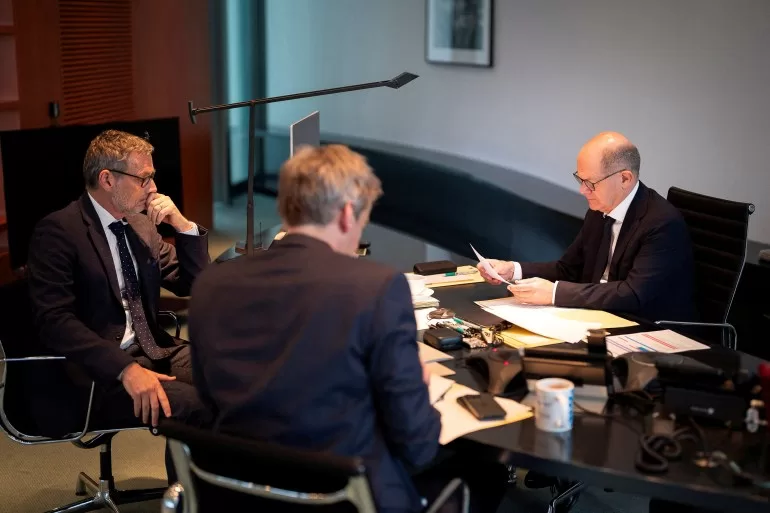The Russian leader said he is open to talks, but intends to keep the territory Moscow seized in Ukraine.
The leaders of Russia and Germany have had their first conversation in almost two years as Western countries prepare for the incoming Trump administration that has signalled its intent to end the war in Ukraine.
German Chancellor Olaf Scholz initiated a phone call with Russian President Vladimir Putin on Friday, which reportedly lasted about an hour and revolved around different aspects of the Ukraine war.
Scholz, who is facing a snap election in February after his government coalition collapsed, urged Putin to negotiate with Ukraine with the aim of achieving a “just and lasting peace” ” government spokesperson Steffen Hebestreit said in a statement.
He also expressed German support for Ukraine “for as long as necessary”, condemned Russian attacks on Ukrainian infrastructure, and warned that the deployment of thousands of North Korean soldiers on Russian soil to fight off the Ukrainian assault on Kursk would mark an escalation.

Putin said the current crisis is a direct result of NATO’s aggressive policies in what was described by the Kremlin as “a detailed and frank exchange of opinions”.
“Possible agreements must take into account the interests of the Russian Federation in the area of security, proceed from new territorial realities, and most importantly, eliminate the root causes of the conflict,” the Russian leader said.
Putin and Scholz also reportedly discussed bilateral relations, with the former saying Moscow remains ready for “mutually beneficial cooperation” including on energy trade if the same view is shared by Berlin.
The call comes at a difficult time for Ukraine’s military, with Russian forces advancing in several areas in eastern Ukraine. The re-election of Donald Trump as US president also raises questions over the future of US aid to Kyiv.
Ukrainian President Volodymyr Zelenskiy said the call opened “Pandora’s box” by undermining efforts to isolate the Russian leader. “Now there may be other conversations, other calls. Just a lot of words. And this is exactly what Putin has long wanted: it is extremely important for him to weaken his isolation,” Zelenskyy said in his evening address.
Scholz spoke with Zelenskyy before and after the call with Putin.
Reporting from Berlin, Al Jazeera’s Dominic Kane said the call was largely being seen in relation to Trump’s re-election and the upcoming election in Germany.
“The suggestion coming from various media outlets is that this is to be viewed through the prism of what’s happening in Washington, DC and the approach from the looming Donald Trump administration,” he said.
“Another point is that there’s going to be a general election in Germany, 100 days from today. The war in Ukraine is a growing issue. Many people in this country, particularly in the old east, want an end to the war in Ukraine and specifically an end to Germany financing and arming the Ukrainians.”
President-elect Trump has asserted he will end the war in Ukraine but has not given details. Vice President-elect JD Vance has suggested a second Trump administration will be in favour of allowing Russia to keep the Ukrainian land it has seized during the war.
The outgoing Biden administration has signalled it will strengthen its support for Ukraine before it leaves the White House in January.
The phone call between the Russian and German leaders comes as fighting continues to rage in eastern Ukraine, where Russian forces have been inching forward in recent months.
The Russian military also continues to direct air strikes against military and civilian infrastructure in Ukraine, hitting a residential building and a boiler plant in Odesa in one of its latest attacks on Friday.
Russia denies targeting civilians in Ukraine.
